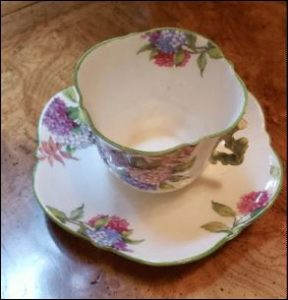Broken Things
 Yes, you can see that this exquisite Aynsley English tea cup has a broken handle. It’s broken, so why don’t I throw it away? After all, I have a cupboard full of unbroken cups. Why not trash it and use a good cup?
Yes, you can see that this exquisite Aynsley English tea cup has a broken handle. It’s broken, so why don’t I throw it away? After all, I have a cupboard full of unbroken cups. Why not trash it and use a good cup?
I keep it because it is precious to me. My pastor’s wife gave it to Walt and me for a wedding gift way back in 1948.
I keep it because it’s beautiful to me. The delicate and unusual shape of the saucer, the pretty flowers, the gold rim all combine to make it beautiful. It pleases me.
I keep it because it is still useful. A cup of tea tastes warm and sweet even if I hold it with half a handle.
And I keep it, especially, because it reminds me that though I am flawed and broken, chipped and faded, my dear Heavenly Father loves me and enjoys taking care of me.
Psalm 103:13,14 (nlt) says,
The LORD is like a father to His children,
tender and compassionate to those who fear Him.
For He understands how weak we are;
He knows we are only dust.
How does God look at all us broken, damaged people? Like a father who takes his little boy in his arms after the child has had a melt-down. He isn’t surprised the child is easily angered, easily frustrated. And he comforts and reassures his son that he still belongs in the family. Sure, he’ll teach the child and reprimand him when he needs it, but his loving arms are always opened wide for comfort.
The father remembers that God made both him and his child out of the dirt of the ground. (Genesis 2:7 says, “And the LORD God formed man of the dust of the ground, and breathed into his nostrils the breath of life; and man became a living being.”)
So God isn’t surprised or disappointed when we fail, when we are rude or deceitful, when we put our own needs and desires above those we should be caring for. “He knows that we are dust.”
Psalm 139:23 says it this way:
He remembered our utter weakness.
His faithful love endures forever.
And He can forgive us because His dear Son gave His life for our redemption.
If God is so gracious, so kind to us in our brokenness, shouldn’t we reflect that grace toward other people who are also flawed and broken? Is it right for us to hold a higher standard for others than we are able to reach ourselves? Should we trash someone who in a moment of weakness failed to keep their own values? Sure, we’ll uphold the law. We’ll expect those in authority to do right. But all authorities in our lives are also human. They too were made out of dirt. They will sometimes fail us.
Thank God that He remembers us in our utter weakness, because His mercy endures forever. May I remember His mercy in my relationships with other broken people. May I look for the good, the beautiful, the precious still to be found in them.
A Word of Encouragement from Elizabeth Rice Handford
 Yes, you can see that this exquisite Aynsley English tea cup has a broken handle. It’s broken, so why don’t I throw it away? After all, I have a cupboard full of unbroken cups. Why not trash it and use a good cup?
Yes, you can see that this exquisite Aynsley English tea cup has a broken handle. It’s broken, so why don’t I throw it away? After all, I have a cupboard full of unbroken cups. Why not trash it and use a good cup?